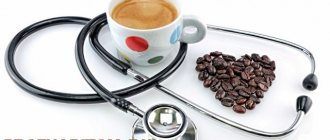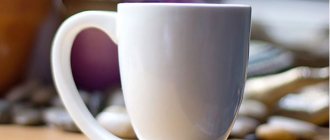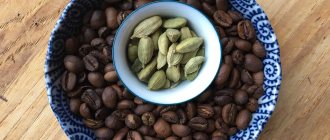Today, there are a huge number of coffee lovers, many of whom simply cannot imagine a day without this invigorating hot drink. However, in addition to the benefits and excellent taste, coffee has a rather negative effect.
Scientists have been studying the effects of coffee on the body and, in particular, on blood cholesterol levels for several centuries.
We have collected and analyzed a lot of relevant information about scientific research and medical practice, so this article is intended to determine as clearly as possible what effect the consumption of coffee beans has on cholesterol and in what doses it is still allowed to drink coffee with elevated blood cholesterol levels.
The effect of coffee on high cholesterol.
Coffee itself does not contain cholesterol. But it contains a special organic compound, the cafestol molecule, which is found in natural fatty acids. Cafestol indirectly affects the activity of cholesterol production. It irritates the epithelium of the small intestine, changes the activity of liver cells and the synthesis of fatty acids. Because of this, the body begins to produce more cholesterol, and its content in the blood increases.
Cafestol is not as harmful as it might seem. It reduces the ability of cells to become cancerous and helps treat Parkinson's disease.
As a result of studies on volunteers with high cholesterol levels who agreed to drink 5 cups of Turkish coffee daily, it was found that in just a month, blood cholesterol levels increased by 8% in women and by 10% in men. With each cup, 5-6 mg of cafestol entered the body.
Cafestol is found only in Turkish-boiled drink.
Alternative drinks
The ideal solution for patients with high cholesterol is to cleanse the drink from cafestol. Today, the food industry has advanced so much that this task is not impossible: coffee can indeed be deprived of cafestol if the essential oils are removed from them during chemical processing of the beans. Such a drink will ultimately not contain cafestol and will not be able to raise cholesterol levels, but it will also no longer be a pleasant-tasting and invigorating coffee.
In search of an alternative, doctors suggest that patients drink drinks that are similar in taste and effect. For many patients, switching to chicory, cocoa and green coffee is absolutely painless, because it’s all a matter of habit.
IMPORTANT! Doctors recommend using green coffee not only as a morning ritual, but also as a means to prevent malignant neoplasms, since unroasted beans contain natural antioxidants to protect the body from various diseases.
Thanks to the content of purine alkaloids, it tones, helps to lose weight, and invigorates in the morning. Many of the effects of black coffee are absolutely not affected, and the person receives an equally healthy drink, but without cafestol. The only thing you need to get used to is the specific taste and smell of the drink.
Another innovation is a caffeine-free drink. It would seem that your favorite drink will not cause harm to patients with high blood pressure. But here it is necessary to take into account that such a product undergoes a number of complex chemical transformations; it is affected by orthophosphoric, sulfuric and carbonic acids; preservatives, coloring pigments, and flavorings are found in coffee, which do not make such a drink completely safe for people with health problems.
Is it possible to drink natural coffee if you have high cholesterol?
Cafestol is formed only if the ground grains are poured with boiling water or the drink is brewed in a Turk.
It comes from the natural oils contained in coffee beans that are released during roasting. Arabica contains more of it than Robusta, although the latter contains more caffeine. The longer the preparation process, the more caffeine passes into the finished drink. The amount of cafestol does not depend on the caffeine present, but only on the preparation of the drink.
Scandinavian coffee, which is boiled, contains the most cafestol. And in espresso, which is poured with boiling water. If you leave the coffee in the Turk until it boils, there will be more cafestol. In Turkish coffee, which is simmered on sand and only brought to a boil, but not allowed to boil, there is less cafestol.
However, you don’t have to be afraid of this organic compound, and it won’t harm you in any way if you use the simplest filtration method. Cafestol can be easily removed from the drink if you use paper filters - they are usually sold for coffee machines, but you can make one yourself, for example, from a folded napkin or kitchen towel. The molecules remain on the paper, and the coffee turns out to be harmless in terms of increasing cholesterol. Filter coffee machines also “retain” cafestol so that it does not cause an increase in cholesterol levels.
You can drink natural coffee if you have high cholesterol if you use filters.
What's in coffee
- Soluble carbohydrates. They make up about a third. The most important of these is sucrose.
- Organic acids. The number of their types is even more than 30. Among them, chlorogenic one should be noted. Its presence just proves the positive effect of coffee on the body. Chlorogenic acid promotes the construction of protein molecules. It also improves nitrogen metabolism. There is no other plant that contains as much chlorogenic acid as coffee beans. Of course, during the roasting process various chemical reactions occur, as a result of which some of the beneficial organic acid is lost. But even its remnants are enough for coffee to stimulate the processes described above. You can also find malic, caffeic, acetic, oxalic and citric acids in coffee.
- Caffeine. This is the most important component that everyone knows. It is with these components that numerous disputes about the properties of the drink are associated. Caffeine is an organic alkaloid, which is why coffee can become addictive and even addictive over time. It is thanks to this component that a person feels nervous excitement and vigor.
- Essential oils. They have such a wonderful coffee aroma associated with them, which is why many people drink coffee. Some oils have beneficial properties, such as fighting inflammation. Most aroma compounds are created during the roasting of coffee beans. This depends on many factors, including temperature.
- Vitamin P. 100 g of coffee contains one fifth of the daily value of this substance. The vitamin strengthens the circulatory system well.
- Potassium, iron, calcium and phosphorus. Everyone knows that for strong bones you need to consume enough calcium. The remaining elements are no less important for the normal functioning of the body. Potassium has a positive effect on the condition of blood vessels. Paradoxically, the drink harms them due to increased cholesterol levels, but also helps due to the presence of potassium.
It is worth noting that there is no cholesterol in coffee itself. And the drink cannot be called fatty and high-calorie. However, you can influence cholesterol levels not only by adding it to the body.
Instant coffee for high cholesterol
Despite the fact that instant coffee is considered more harmful to the human body than natural coffee, it contains neither cholesterol nor cafestol. The natural oils are simply removed during the making of the powder or granules, and instant coffee is not brewed. Therefore, if you are concerned about your cholesterol levels, it is better to prefer instant coffee from this point of view. But remember that it contains preservatives, dyes, stabilizers and many other chemical components. The share of natural coffee in instant coffee is no more than 15-25%. Therefore, the benefits to the body are questionable. But there is definitely no cafestol there.
Composition of the product
Coffee is a completely natural product. It contains various elements (up to 2000), among them the following are present:
- vitamins PP;
- B vitamins;
- essential oils (flavor-forming);
- magnesium;
- phosphorus;
- potassium;
- sodium;
- iron;
- calcium;
- about 20 types of acids;
- polysaccharides.
The main element, despite their wide range, is caffeine. This element is a natural alkaloid; it has a direct effect on the functioning of the nervous system. Its effect is manifested in stimulation and activation of the central nervous system, an increase in heart rate, and an increase in blood pressure. In addition, the element stimulates the production of dopamine, which is sometimes called the “happiness hormone.” This explains that excessive coffee intake can provoke a pathology identical to alcohol addiction.
Coffee in small quantities has a beneficial effect on the body
However, some scientists claim that drinking coffee in certain quantities reduces the likelihood of dangerous pathological diseases. Consuming 2 cups of coffee per day significantly reduces the risk of occurrence and promotes a simpler progression of the following pathologies:
- Alzheimer's;
- Parkenson;
- diabetes;
- asthma;
- various types of stroke.
The drink helps slow down the aging process, has a positive effect on the ability to concentrate and attentiveness, comprehensively promotes the activation of brain activity, good mood, reducing stress levels, and has a slight laxative and diuretic effect.
American scientists claim that patients with atrial fibrillation are 18% less likely to have complications of the disease than those who regularly drink coffee. However, it must be taken into account that the drink has contraindications, which include pathologies of the heart and vascular system. Related to this is the relevance of a frequently asked question: in what cases is it necessary to completely stop drinking the drink?
Decaffeinated coffee
In principle, it is possible, since caffeine does not participate in the process of cholesterol synthesis. It is cafestol that matters, and natural decaffeinated coffee contains it, like other natural oils. That is, if you prefer ground coffee without caffeine, the principles of safe consumption with high cholesterol are the same as for regular natural coffee - the finished drink must be filtered through a filter. If you drink decaffeinated instant coffee, if you have high cholesterol, it will not increase its blood level.
How to lower cholesterol at home?
It is much easier to lower cholesterol at home than in a hospital setting. It is also easier to do this for a non-working person who is constantly at home than for someone who is forced to go to work every day. This is primarily due to the fact that at home a person is less susceptible to stress and nervous tension. There is an opportunity to relax and have a full lunch. This is very important for the treatment and prevention of any diseases. It is important to follow a daily routine and eat well. Food should be healthy and dietary.
You need to take a walk in the fresh air every day. Walking and jogging are useful, preferably at the same time. Swimming, fitness, and active training have a positive effect. A positive effect can be achieved by practicing hatha yoga and qigong daily. They allow you not only to normalize the physical body, but also to harmonize your mental state, which is very important for maintaining health.
Particularly effective are various treatment and prophylactic complexes, specially selected exercises aimed at normalizing the activity of internal organs and systems. Normalization of metabolic processes can be achieved with the help of special breathing exercises, relaxation practices, and meditative complexes. It is important to practice methods of internal contemplation and self-healing, autogenic training.
Allow yourself time for your favorite activity, for rest, relaxation, and enjoying silence. Turn on relaxing music and candles. You can try using an aroma lamp with incense and essential oils, which will help you relax and find harmony. Accordingly, your physical and mental state and metabolic processes are normalized. Baths with medicinal decoctions and essential oils are useful. At night it is useful to carry out a light massage using natural oils and plant extracts.
Conclusions:
- It is not prohibited to drink coffee if you have high blood cholesterol levels.
- It is not caffeine that causes an increase in cholesterol, but the substance cafestol, which is found in the natural fatty acids of coffee beans.
- Regular natural coffee needs to be filtered through a filter. Soluble and green can be consumed as they do not contain cafestol.
- Decaffeinated coffee contains cafestol if it is ground, and not if it is instant.
- The longer natural coffee is prepared, the more cafestol it contains.
Advantages and disadvantages of coffee
Coffee is an exquisite and unique gift from nature itself. Coffee beans saturate the human body with vitamins, protein structures, macro and microelements. The most important beneficial properties of the drink can be noted:
- Reduces the amount of glucose in the blood, preventing the development of diabetes.
- Prevents stone formation in the kidneys and gall bladder.
- Tones the nervous system, helps with sleep disorders.
- Reduces the risk of cancer.
- Improves blood circulation.
- Eliminates muscle pain after workouts.
- Prevents the development of liver cirrhosis.
- Accelerates metabolic processes.
- Burns fat, making it easier to lose excess weight.
- Helps get rid of dizziness and migraines.
On the other hand, the coffee drink also has disadvantages:
- Causes an increase in cholesterol in the blood.
- Promotes the development of arthrosis.
- Highly addictive. If you suddenly stop drinking, you feel constantly tired and sleepy.
- Lashes out calcium.
- Provokes attacks of heartburn.
- Disturbs the heart rate. If you have existing pathologies of the heart or blood vessels, the influence of caffeine can cause great harm to health, so before drinking coffee you should consult your doctor.
How to lower cholesterol with foods?
Sea fish is good for the blood, so the diet should include about 200 grams of it per week, which will make it possible to prevent blood clots.
Various types of nuts contain components that are beneficial for blood vessels. Approximately 30 grams of nuts daily provide reliable protection against cholesterol deposits. It is recommended to replace fatty foods with vegetable oils. Sesame oil has a good effect on blood vessels. The method of culinary processing of products is also important. You should not fry foods; you should use the oil in its raw form when seasoning prepared foods. It is recommended to eat as much fiber as possible. It is recommended to eat olives, olives, as many fruits and vegetables, and herbs as possible. It is better to eat bread made from bran. This is a source of pectins, which help remove excess cholesterol from the body.
Juice therapy will have a positive effect on the body. To achieve a positive effect, it is recommended to drink various juices at least 2-3 glasses a day. It is better to alternate juices among themselves. Citrus juices, apple and grape, are especially useful. It is recommended to add a little lemon juice (freshly squeezed) to each type of juice. You can take beetroot, carrot, cabbage juice. They should be taken in about a third of a glass. how to lower cholesterol with lemon and garlic
Lemon has proven itself as a remedy aimed at reducing oxidative stress. It is a powerful antioxidant, saturates the body with vitamin C, helps eliminate waste, toxins, and normalize metabolic processes. Garlic has an anti-inflammatory and antiplatelet effect, prevents the accumulation of substances in the body, resolves blood clots and compactions. Together they complement each other's action.
Can be taken in various forms. Lemon is often added to tea and eaten in slices. Lemon-garlic puree has proven itself well. To prepare, take 1 lemon and pass it through a meat grinder along with the peel. The juice is separated from the puree mass. Squeeze 5-6 cloves of garlic separately through the spade. Mix garlic and lemon puree, mix thoroughly until a homogeneous mass is formed, consume a teaspoon 2-3 times a day. The product is stored in the refrigerator.











